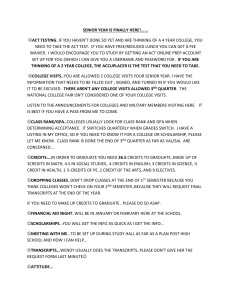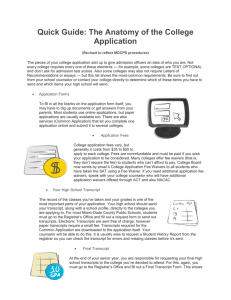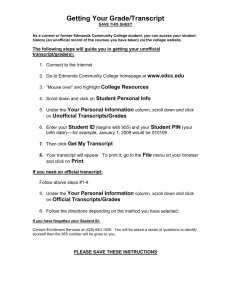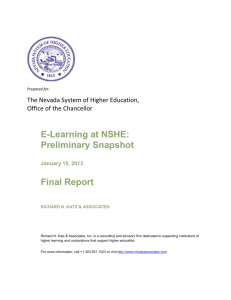Transfer FAQ`s - University of Nevada, Reno
advertisement
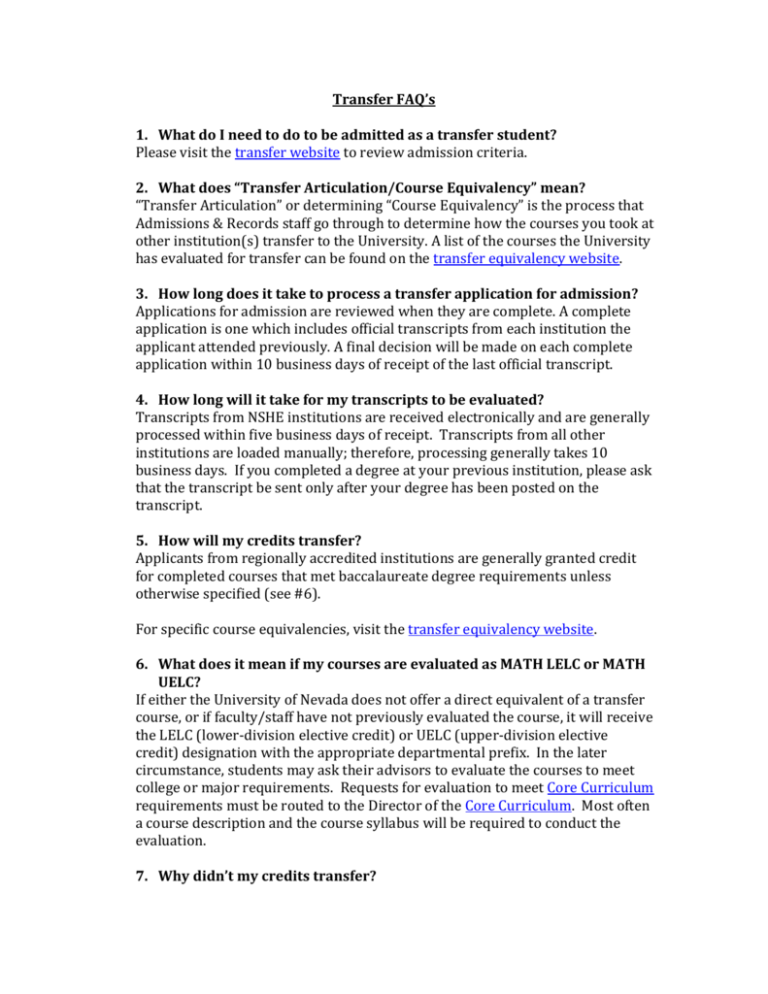
Transfer FAQ’s 1. What do I need to do to be admitted as a transfer student? Please visit the transfer website to review admission criteria. 2. What does “Transfer Articulation/Course Equivalency” mean? “Transfer Articulation” or determining “Course Equivalency” is the process that Admissions & Records staff go through to determine how the courses you took at other institution(s) transfer to the University. A list of the courses the University has evaluated for transfer can be found on the transfer equivalency website. 3. How long does it take to process a transfer application for admission? Applications for admission are reviewed when they are complete. A complete application is one which includes official transcripts from each institution the applicant attended previously. A final decision will be made on each complete application within 10 business days of receipt of the last official transcript. 4. How long will it take for my transcripts to be evaluated? Transcripts from NSHE institutions are received electronically and are generally processed within five business days of receipt. Transcripts from all other institutions are loaded manually; therefore, processing generally takes 10 business days. If you completed a degree at your previous institution, please ask that the transcript be sent only after your degree has been posted on the transcript. 5. How will my credits transfer? Applicants from regionally accredited institutions are generally granted credit for completed courses that met baccalaureate degree requirements unless otherwise specified (see #6). For specific course equivalencies, visit the transfer equivalency website. 6. What does it mean if my courses are evaluated as MATH LELC or MATH UELC? If either the University of Nevada does not offer a direct equivalent of a transfer course, or if faculty/staff have not previously evaluated the course, it will receive the LELC (lower-division elective credit) or UELC (upper-division elective credit) designation with the appropriate departmental prefix. In the later circumstance, students may ask their advisors to evaluate the courses to meet college or major requirements. Requests for evaluation to meet Core Curriculum requirements must be routed to the Director of the Core Curriculum. Most often a course description and the course syllabus will be required to conduct the evaluation. 7. Why didn’t my credits transfer? Credits are generally awarded for courses that meet baccalaureate degree requirements completed at regionally accredited institutions. If you completed work at an institution that was not regionally accredited, you may not receive credit for that work. If you took remedial/developmental/occupational courses elsewhere, you will not be awarded degree credit for that work regardless of the accreditation status of the transfer institution. 8. Accreditation status and what it means? Regionally Accredited Institutions: Credits earned at accredited institutions, or at institutions that are approved candidates for accreditation, by one of the following regional accrediting associations recognized by the Council for Higher Education Accreditation (CHEA), are normally transferable, provided the courses are comparable to those offered by the University of Nevada, Reno, or other regionally accredited colleges and universities, and the courses are relevant to the student’s academic program. • Middle States Association of College and Schools (MSA), Middle States Commission on Higher Education; • New England Association of Schools and Colleges (NEASC-CIHE), Commission on Institutions of Higher Education; • New England Association of Schools and Colleges (NEASC-CTCI), Commission on Technical and Career Institutions; • North Central Association of Colleges and Schools (NCA-HLC), The Higher Learning Commission; • Northwest Commission on Colleges and Universities (NWCCU); • Southern Association of Colleges and Schools (SACS), Commission on Colleges; • Western Association of Schools and Colleges (WASCACCJC), Accrediting Commission for Community and Junior Colleges; • Western Association of Schools and Colleges (WASCACSCU), Accrediting Commission for Senior Colleges and Universities. For additional information on accreditation visit http://catalog.unr.edu/content.php?catoid=6&navoid=1469 9. What is an NSHE Core Waiver? The completion of the associate of arts, associate of science, and associate of business degree at an NSHE community college automatically fulfills the lowerdivision general education requirements at any other NSHE institution. However, many programs at the University require specific Core coursework as preparation for the major. Students are strongly encouraged to review major program descriptions in the University of Nevada general catalog and to consult with a University transfer advisor to select general education coursework to ensure that work completed for their NSHE AA or AS will satisfy major-specific lower-division Core Curriculum requirements. 10. What is an IGETC Core Waiver, CSU Breadth Core Waiver, or Texas Common Core Waiver? The Intersegmental General Education Transfer Curriculum (IGETC), California State University Breadth Agreement (CSU Breadth), or Texas Common Core agreement are the transfer core components that students transferring from California or Texas may have completed. For more information, please visit the University of California website or the Texas Higher Education Coordinating Board website. For students entering the University of Nevada, Reno, completion of all IGETC, CSU Breadth, or Texas Common Core requirements may permit a student to transfer from a California community college or a Texas public institution without the need, after transfer, to take additional lower-division Core Curriculum courses. (Per the NSHE Board of Regents, all students must complete ENG 102 and instruction in the United States and Nevada constitutions.) However, many programs at the University require specific Core coursework as preparation for the major. Students are strongly encouraged to review major program descriptions in the University of Nevada general catalog and to consult with a University transfer advisor to select general education coursework to ensure that work completed for the IGETC, CSU Breadth, or Texas Common Core will satisfy major-specific lower-division Core Curriculum requirements. Certification of completion of all IGETC, CSU Breadth, or Texas Common Core requirements must appear on the official college transcript or on a separate official document issued by the institution. Partially completed certification will not be accepted. 11. Core Waiver for Previous Bachelor’s Degree? Students with a previous bachelor’s degree from a regionally-accredited institution may transfer to the University without the need, after transfer, to take additional lower-division Core Curriculum courses (with the exception of United States and Nevada constitutions). However, many programs at the University require specific Core coursework as preparation for the major. Students are strongly encouraged to review major program descriptions in the University of Nevada general catalog and to consult with a University transfer advisor. 12. Can I meet the Core Humanities requirement with other coursework? In general, NSHE students, who have not completed a transfer AA or AS degree, may satisfy the Core Humanities requirements with non-CH courses only if they do so before matriculating to the University. See the Core Curriculum agreements available at http://www.unr.edu/transfer/admissionrequirements/transfer-agreements to identify acceptable coursework. 13. Why can’t I enroll online when another course has been approved as a substitute for the prerequisite course? The approved substitute course must be evaluated as a direct equivalent of the prerequisite course to allow online registration. When that is not the case, you must come to the counter where one of our helpful staff will review your Academic Advisement Report (AAR), and, if it is appropriate, do the enrollment for you. 14. If I have earned a bachelor’s degree previously, do I have to meet the 2.5 grade point average requirement to be admissible? Students who have completed a bachelor’s degree at another regionally accredited institution may be admitted to the University as second bachelor’s students and are not subject to the 2.5 grade point average requirement. 15. Can I appeal denial of my transfer admission? There is no formal appeal process for denial of admission as a transfer student; however, the most common reasons that applications are denied are: Reason for denial Transcripts from all of the institutions attended were not received. The transcript included too few credits or the grade point average associated with the coursework was too low. The admission application fee was not paid. Remedy Submit a new application for admission and make transcript requests immediately. Complete additional coursework at another regionally accredited institution to earn more credits and/or improve your transfer grade point average. Submit a new application for admission and pay the application fee promptly. 16. Is the admission grade point average that appears on the transfer summary line on the UNR transcript calculated on the basis of all transferrable work? Yes. 17. Can in-progress work be included in the 24 credits required? No. Admission criteria is based, in part, on 24 credits being completed. 18. If I have been dismissed or suspended from my previous institution can I be admitted to UNR? Yes, as long as all admissions requirements have been met. 19. What if I have more than 60 transferable credits? Do I get to pick which ones will apply at the University? No, we articulate all of the work on the transcript. Students may transfer more than 60 credits, but they must complete at least 60 credits at four-year institutions to earn a degree at the University. Transfer students with 60 or more credits must declare a major by the end of their first semester. 20. I earned my baccalaureate degree in 1980, will the credits transfer? Yes, the credits will transfer at least as general elective credit. However, in areas of study in which the subject matter changes rapidly, material in courses taken long before graduation may become obsolete. Courses that are more than 10 years old are applicable toward completion of specific major or minor requirements at the discretion of the student’s major or minor department. Departments may approve, disapprove, or request that the student revalidate the substance of such courses. Students whose major or minor programs include courses that will be more than 10 years old at the expected time of graduation should consult with their major or minor department as early as possible to determine the acceptability of such courses. Departments may adopt a more restrictive policy where accreditation and/or licensure requirements limit the applicability of courses to fewer than 10 years. 21. If I transfer from an NSHE two-year college to the University, is my catalog year (requirement term) awarded when I enter a degree program at the two-year college or when I transfer to the University? First, the general catalog includes detailed descriptions of each of the degree programs offered at the University. A new general catalog is published online each year because the degree program requirements change often. To be eligible for graduation, students must complete the degree requirements in either the general catalog published the year they formally entered the degree program or the year they intend to graduate from the program. Students who start their careers at NSHE two-year colleges may use the catalog year awarded when they formally entered the general transfer AA or AS program as long as there is clear transcript evidence that they were taking baccalaureate degree applicable coursework throughout their career. 22. I have attended both TMCC and UNR for each of the last three semesters. Why do I have to send my TMCC transcripts to UNR at the end of each semester? Can’t I just wait to request transcripts until I am ready to graduate? First, while all NSHE institutions use the same student information software, transcript data is not automatically shared among NSHE institutions. UNR cannot see TMCC records and vice versa. The Family Educational Rights and Privacy Act of 1974 requires all institutions of higher education to protect the confidentiality of student records; therefore, students must authorize the release of transcript data from one NSHE institution to another. Second, students are very strongly encouraged to carefully review their current academic advising report (AAR) with an academic advisor at least once per semester. The AAR is current only if it includes all courses that meet baccalaureate degree requirements completed whether at this University or at another institution of higher education. Students are required to submit transcripts including final grades for transfer work completed in prior terms by the end of the late registration period for each term. 23. What is reverse transfer? Reverse transfer is a process that allows a student from a NSHE associate degree granting institution to matriculate to and take courses at the University that can be used to fulfill remaining associate degree requirements at the NSHE associate degree granting institution. Particularly in science and engineering programs, students who plan to complete both associate and bachelor’s degrees may be required to matriculate to the University prior to completing the requirements for a transfer associate degree. In these cases, students may develop an individual reverse transfer agreement to earn their associate degree. Prior to enrolling at the University, students must meet with an advisor at the associate degree granting institution to determine how coursework completed at the University will be used to meet outstanding associate degree requirements. When the mutually agreed upon University coursework is complete, students must send an official University of Nevada transcript to the NSHE associate degree granting institution. Students may be required to complete an application for graduation at the associate degree granting institution prior to the processing of the University transcript. Students should contact an academic advisor at their transfer institution for more details on the reverse transfer process. 24. Am I required to provide transcripts from all of the schools I have attended previously? Yes. 25. I have already been admitted to the University, why is there a hold on my record for transcripts? Students are very strongly encouraged to carefully review their current academic advising report (AAR) with an academic advisor at least once per semester. The AAR is current only if it includes all college-level work (courses that meet baccalaureate degree requirements) completed whether at this University or at another institution of higher education. Students are required to submit transcripts including final grades for transfer work completed in prior terms by the end of the late registration period for each term. If they fail to do so, a registration hold is placed on their record. The hold is released via an overnight process when the transcript is received. 26. What is the due date for transfer applications for admission? The transfer application deadline for fall admission is July 15th. The transfer application deadline for spring admission is January 5th. 27. Does UNR award college credit for the Advanced Placement and/or International Baccalaureate courses I took in high school? If so, when will that credit be posted on my University of Nevada record? You will find specifics on test credit awarded on the basis of your College Board Advanced Placement Examination or International Baccalaureate Examination scores in the general catalog. Test credits will be posted on your record only after official scores have been received directly from the testing agency. Please allow five business days from the date of receipt for processing of test scores in the Office of Admissions and Records. 28. I am planning on starting my college career at an NSHE two-year institution. Can I develop a transfer agreement with the University to avoid taking courses at the two-year institution that do not meet specific baccalaureate requirements? The University of Nevada publishes transfer agreements with each NSHE twoyear institution for each baccalaureate program offered. These agreements are updated annually and can be accessed at http://www.unr.edu/transfer/admission-requirements/transfer-agreements. Access and print the agreement for the program you intend to enter here and bring it to each advisement appointment. Transfer agreements are developed based on the requirements for the general transfer AA and AS degrees offered at each NSHE two-year institution. You can access transfer equivalency information for individual courses at: https://www.cis.unr.edu/Transfer/TA.aspx .


